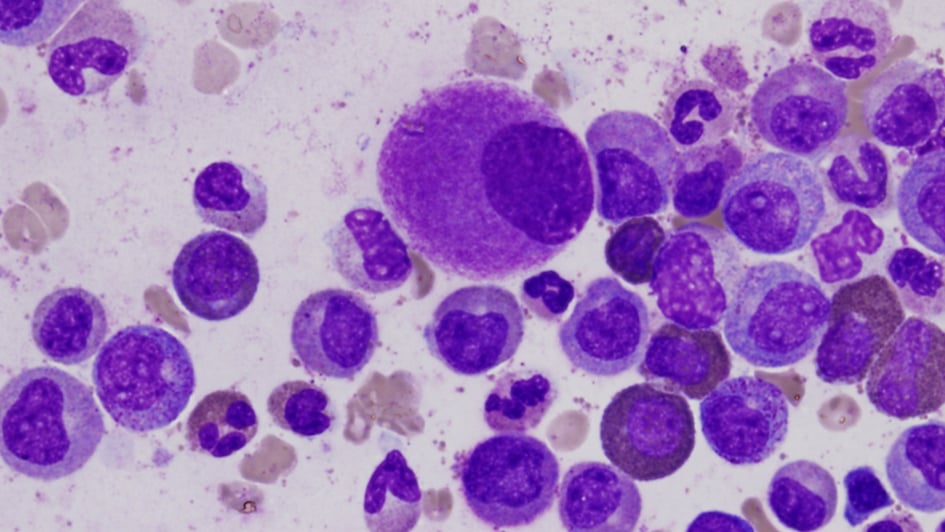Image: Deformed cells in the bone marrow, typical of chronic leukaemia. Photo: Difu Wu
Death from infection in CLL patients linked to specific gene mutations
Earlier this year, we shared news of a study led by scientists here at The Institute of Cancer Research, which found that patients with chronic lymphocytic leukaemia (CLL) carrying specific gene mutations were more likely to die from contracting an infection than those without.
The study showed that patients carrying one or more mutations in the BRAF, FBXW7, NRAS or XPO1 genes have a higher risk of dying from infection, and was the first study to analyse the causes of death of CLL patients in detail.
Monica Else, Honorary Senior Scientific Officer in the Division of Molecular Pathology at the ICR, and one of the lead authors of the study, said:
“Our study […] could help to inform future treatment strategies for patients with these infections. It also raises the intriguing possibility of a relationship between these genes and the origin of infections in leukaemia.”
Read the full story: >Gene mutations linked with death from infection in patients with chronic lymphocytic leukaemia
First Covid vaccine provides protection for myeloma patients
In April, we revealed that a single dose of a Covid-19 vaccine triggers an immune response in around 70 per cent of patients with myeloma.
In the study, scientists at the ICR and our partner hospital The Royal Marsden NHS Foundation Trust, analysed the blood of patients who had received a first dose of vaccine, looking for antibodies for the coronavirus.
Study co-leader Dr Kevin Boyd, Consultant Haematologist at The Royal Marsden NHS Foundation Trust and Leader of the Myeloma Diagnostics and Novel Treatments team at the ICR, said:
“This study is not reassuring for every patient, as we do see reduced vaccine response rates compared with the general population. However, overall the results are encouraging, showing that the majority of patients do respond to their first vaccine dose, and I expect this to improve following the second dose. As society begins to unlock, our patients wish to start seeing relatives and loved ones again and, like all of us, start to enjoy a more normal life. I hope this study provides some reassurance that this should be possible.”
Read the full story: First Covid jab provides protection for most myeloma blood cancer patients
Four-drug combination therapy slows progression of myeloma
Last month, we reported results from a new study, showing that a combination of four drugs, including a new drug called carfilzomib, can slow the progression of myeloma in newly diagnosed patients.
Results from the Myeloma XI+ trial showed that patients who received the drug combination had a 37 per cent reduced risk of their disease progressing, or death overall.
The study’s leading co-author Dr Charlotte Pawlyn, Team Leader in Myeloma Biology and Therapeutics at the ICR and Consultant in Haematology at The Royal Marsden, said:
“The results of this major, long-running clinical trial in patients with myeloma have established the benefit of carfilzomib in a quadruplet combination with lenalidomide, including in patients with newly diagnosed disease. We hope that these results now lead to the drug being approved for wider use on the NHS, as it is currently only available to UK patients in limited settings.”
Read the full story: Combination drug therapy can significantly benefit patients with newly diagnosed blood cancer
A promising new drug enters its first trial
We recently announced the news that a drug discovered at the ICR has entered its first clinical trial. The trial is currently recruiting patients at hospitals in the UK and Australia, including The Royal Marsden.
The drug, called EP0042, could counteract drug resistance and has shown promise as a potential treatment for patients with acute myeloid leukaemia (AML).
The trial is due to complete in autumn 2023 and, if successful, the drug could go on to larger trials and ultimately become a new treatment for cancers including AML.
Dr David Taussig, Consultant Haematologist at The Royal Marsden and Honorary Team Leader in Acute Leukaemia at the ICR, is the global co-ordinating investigator on the study. He said:
“It’s incredibly challenging to develop drugs for acute myeloid leukaemia as the disease is often aggressive and prone to resistance, so survival rates are currently poor for many patients. I’m excited by the potential of EP0042 and, as new treatments are urgently needed for people with this diagnosis, I really hope to see a positive impact on patient outcomes following this phase I trial.”
Read the full story: Resistance-busting ICR drug enters clinical trial
Research at the ICR is underpinned by generous contributions from our supporters. You can contribute to our mission to make the discoveries to defeat cancer.
